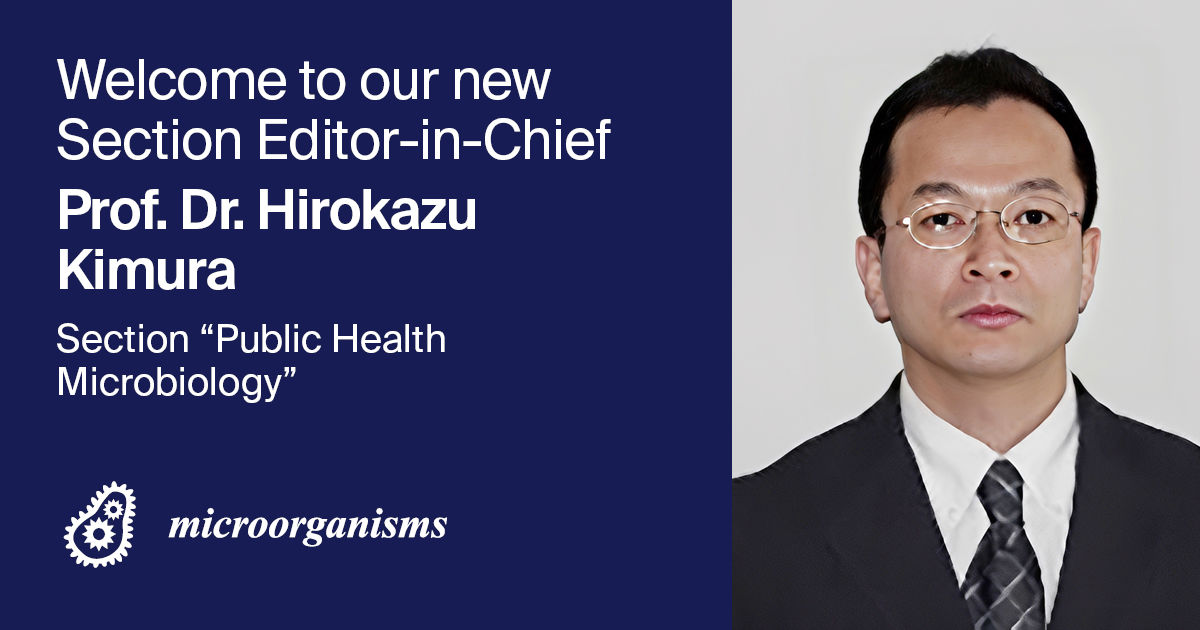
Prof. Dr. Hirokazu Kimura Appointed Section Editor-in-Chief of Section “Public Health Microbiology” in Microorganisms
We are pleased to announce that Prof. Dr. Hirokazu Kimura has been appointed Section Editor-in-Chief of the “Public Health Microbiology” Section in Microorganisms (ISSN: 2076-2607). With his extensive background in scientific research and publishing, he will bring a wealth of knowledge and expertise to this prestigious role.
The following is a short Q&A with Prof. Dr. Hirokazu Kimura, who shared his vision for the journal with us, as well as his views on the research area and open access publishing:
1. Could you share some information about the main lines of research of your group with us?
I have recently been appointed as the Section Editor-in-Chief for the “Public Health Microbiology” Section in Microorganisms. After graduating from a college of medical science, I completed my doctoral studies in biological sciences and subsequently served for eleven years as a Head of the Infectious Disease Surveillance Center at the National Institute of Infectious Diseases (NIID) of Japan. I then moved to my current position as a Professor at the Graduate School of Gunma Paz University, where I have been engaged in teaching and research in microbiology and public health. For nearly three decades, my primary research has focused on clinical virology, as well as molecular epidemiology and molecular evolution based on viral genome analysis.
2. What appealed to you about the journal that made you want to become its Section Editor-in-Chief?
The prevention, diagnostic testing, and treatment of emerging and re-emerging infectious diseases—such as pandemic influenza and COVID-19—that pose significant societal challenges are of paramount importance for implementing effective public health measures. I regard the “Public Health Microbiology” Section of Microorganisms as occupying a vital position in MDPI as an open access journal in disseminating cutting-edge scientific knowledge. For this reason, I have accepted the role of Section Editor-in-Chief.
3. What are your plans and vision for the Section and the journal?
Going forward, I will strive to contribute to the development of the journal by fostering collaboration with other sections, such as those devoted to virology and infectious diseases. I sincerely look forward to working together with colleagues and contributing to the advancement of the journal.
4. What does the future of this field of research look like?
The field of public health microbiology is expected to expand further with the integration of genomic technologies, real-time epidemiological surveillance, and One Health perspectives. Advances in data science and international collaboration will continue to provide powerful tools for monitoring and controlling infectious diseases at both local and global scales.
5. What do you think of the development of open access in the publishing field?
Open access journals have become an indispensable framework for ensuring the rapid and equitable dissemination of scientific knowledge.
Regarding public health microbiology, where timely access to information can directly influence disease control and policy, open access plays a crucial role in bridging the gap between researchers, clinicians, policymakers, and the general public.
I believe its continued development will strengthen transparency, foster collaboration across disciplines and countries, and ultimately accelerate scientific progress.
We wish Prof. Dr. Hirokazu Kimura every success in his new position, and we look forward to his contributions to the journal.
